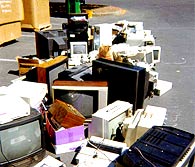 Squatting in a ramshackle hut, six little girls hum as they swing hammers over their tiny shoulders, smashing computer chips.
Squatting in a ramshackle hut, six little girls hum as they swing hammers over their tiny shoulders, smashing computer chips.
The smallest, four-year-old Yao Hong, deftly plucks shiny copper coil from the shattered components, straightens it and throws it into a bucket, oblivious to the possible dangers.
Electronic waste can contain 1,000 different substances including lead, cadmium, chromium and mercury - heavy metals which are highly toxic, a recent report by two environmental groups said.
This brew of toxic substances can damage nervous, kidney and reproductive systems, while some of the metals contain carcinogens, the report said.
For years, so called "e-waste" from richer countries has found its way to China, where armies of rural poor rummage through computer monitors, central processing units, printers, toner cartridges and other high-tech trash to sell what they can to recyclers.
A woman at a market in Beilin Village near Guiyu in China's southern Guangdong Province cleans a computer circuit board to retrieve components, creating an acrid stench.
Despite the Basel Convention, which in 1994 banned the export of hazardous waste from rich to poor countries, electronic waste from the United States and to a lesser extent Europe, South Korea and Japan has ended up on Chinese shores, environmentalists say.
The United States has long resisted adopting the Basel rules.
In Chaoyang county in southern Guangdong Province - China's richest - whole farming families have turned into scavengers over the last decade for extra cash.
"We have no money," said Yao's 70-year-old grandmother, holding up deeply lined palms.
She calls out to the girls, all her granddaughters, reminding them to retrieve copper wires. Completely unprotected, without even basic safety goggles, the girls pound away and laugh as bits of metal and plastic fly.
Unwanted electronic junk is seen in open rice fields everywhere, on riverbanks and in ponds, and some families in the area have stopped drinking well water because it has taken on a yellow hue.
Environmental groups Basel Action Network and Silicon Valley Toxics Coalition, citing recycling industry sources, say as much as 80 per cent of electronic waste collected for recycling in the United States is shipped to Asia, including countries such as India, Pakistan and China.
Every year, approximately 10 million computers are discarded in the United States alone, and the figure will reach 12.75 million in 2002, a recent report by the two groups said.
Asked about the report last week, Chinese Foreign Ministry spokesman Kong Quan said: "The conclusion of the report was very clear - it asked the US Government to take concrete measures not to ship these computers abroad."
"On the Chinese side, we have not confirmed the details but a host of Chinese laws including customs laws and the environmental laws all clearly stipulate that the environment and people's interests in China should be protected."
But Chinese junk dealers say shipments normally dock at Nanhai port in Guangdong, are sorted in warehouses and then trucked to villages around Guiyu in Chaoyang county.
The Yaos' hut in Yaosuwei village near Guiyu is much like dozens of others. Mounds of spent printer cartridges, modems, disk drives, toner casings, circuit boards and wires lie inside and outside as workers plough through them, stripping out everything that is worth anything at all.
Plastics, metals and other recyclable materials lay in heaps everywhere, waiting to be trucked to smelters.
For the Yaos, about 1 pound (0.6 kg) of copper earns three yuan ($0.36) and a pound of metal about 0.30 yuan ($0.04).
In a market in nearby Beilin village, the recycling huts are interspersed with fresh meat and vegetable stalls.
Armed with pliers, perspiring women in front of small furnaces retrieve chips from circuit boards immersed in pools of molten solder. A thick acrid stench hangs constantly in the air.
"This whole business has been going on more than 10 years, although it became really widespread about five to seven years ago," said Chen Zhongnan, 68, who lives nearby.
"The last two to three years were very bad when they started burning all the waste. It's so bad for health and so our village leader stopped them, but some still continue doing it.
"But we don't complain, we need the money."
Those who have made good in the brisk business can now afford to hire hands from poorer provinces further north, who are paid 10 to 30 yuan ($1.21-$3.62) a day.
People involved in the trade openly admit their fears about the possible dangers to their health.
In Chendian village, housewife Chen Jing says her family - also in the junk business - no longer drinks from their well as the water has become yellow due to groundwater pollution.
Playing with her five-year-old daughter on the ground floor of their house littered with disk drives, Chen says they buy drinking water taken from a nearby mountain.
"I do worry about my child's health, but we can't just depend on our paddy fields, that is not enough," she said.
(Shanghai Star March 21, 2002)
